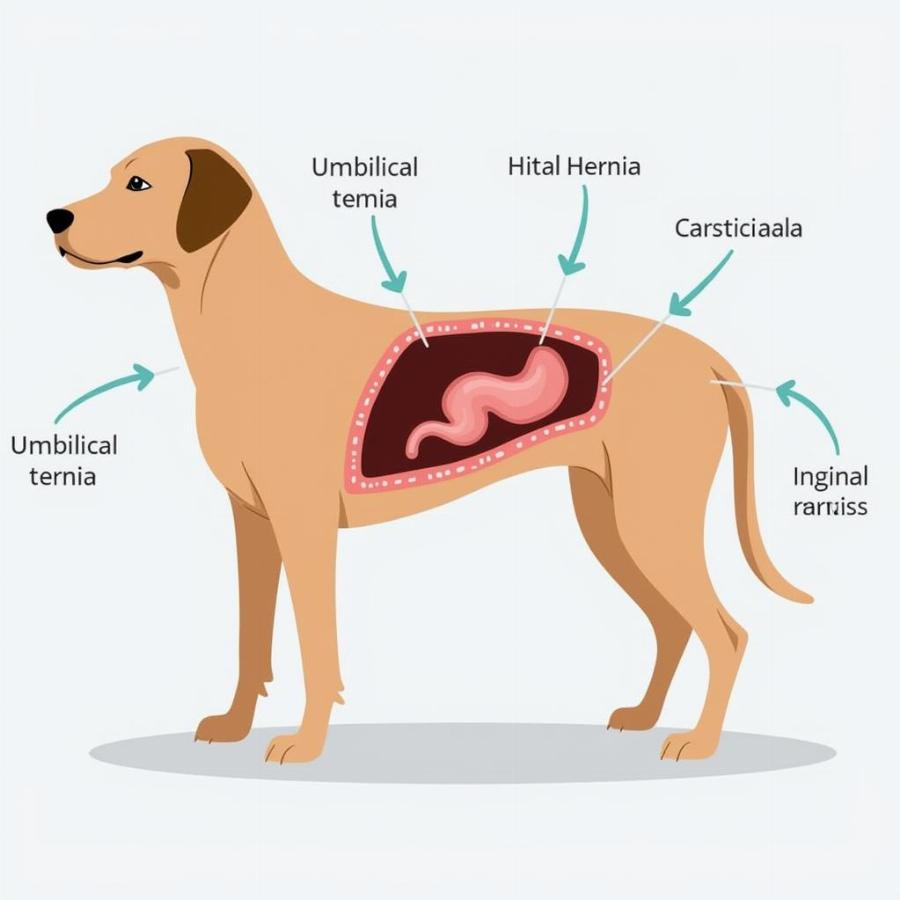Dog hernias are a relatively common health issue in our canine companions. They occur when an internal organ pushes through a weak spot in the surrounding muscle or tissue. While the thought of home remedies for dog hernias might be tempting, it’s crucial to understand that true hernia repair requires veterinary intervention. This article will explore the nature of hernias in dogs, debunk common misconceptions about home remedies, and guide you on when to seek professional veterinary care. Understanding the limitations of home care and the importance of professional diagnosis is paramount for your dog’s well-being.
Understanding Hernias in Dogs
Hernias can occur in various locations on a dog’s body. The most common types include umbilical hernias, inguinal hernias, and hiatal hernias. Umbilical hernias appear as a soft swelling near the belly button and are often present from birth. Inguinal hernias occur in the groin area, while hiatal hernias involve the stomach protruding through the diaphragm. Each type presents different risks and requires specific treatment approaches. While some small, uncomplicated hernias might seem harmless, they can potentially lead to serious complications if left untreated.
 Types of Dog Hernias: Umbilical, Inguinal, and Hiatal
Types of Dog Hernias: Umbilical, Inguinal, and Hiatal
Debunking the Myth of Home Remedies
While the internet may offer various home remedies for dog hernias, such as applying pressure bandages or using essential oils, it’s crucial to understand that these methods are not effective and can even be harmful. Hernias involve a structural defect that cannot be corrected by external applications. Attempting home remedies can delay necessary veterinary care, potentially leading to complications such as strangulation of the affected organ. This can be a life-threatening situation requiring emergency surgery.
When to Seek Veterinary Care
If you suspect your dog has a hernia, it’s essential to consult a veterinarian immediately. The vet will perform a physical examination and may recommend imaging tests such as X-rays or ultrasound to confirm the diagnosis and assess the severity of the hernia. Early diagnosis and appropriate treatment are vital for preventing complications and ensuring your dog’s health.
Surgical Repair: The Definitive Treatment
Surgical repair is the only effective treatment for most hernias. The procedure involves returning the displaced organ to its proper position and reinforcing the weakened area with sutures or mesh. The complexity of the surgery depends on the type and size of the hernia. While surgery may seem daunting, it’s a relatively common procedure with a high success rate when performed by a qualified veterinarian.
Post-Operative Care and Recovery
After hernia surgery, your dog will require careful monitoring and specific post-operative care. This typically includes pain management, wound care, and activity restriction. Your veterinarian will provide detailed instructions on how to care for your dog during the recovery period. Following these instructions diligently is crucial for ensuring a smooth and successful recovery.
Conclusion
While the idea of home remedies for dog hernias may seem appealing, it’s crucial to remember that they are not effective and can be dangerous. Prompt veterinary diagnosis and surgical repair are the best course of action for ensuring your dog’s health and well-being. Don’t hesitate to contact your veterinarian if you suspect your dog has a hernia. Early intervention can prevent serious complications and give your furry friend the best chance for a full recovery.
FAQ
- Can a dog hernia heal on its own? No, hernias require veterinary intervention and typically surgical repair.
- Are all dog hernias emergencies? While some hernias can be monitored, any sudden changes in size or appearance warrant immediate veterinary attention.
- How much does hernia surgery for a dog cost? The cost varies depending on the type and complexity of the hernia and your location. Consult your veterinarian for an estimate.
- What are the signs of a strangulated hernia? Signs include pain, swelling, vomiting, and lethargy. This is a medical emergency.
- How can I prevent my dog from developing a hernia? Some hernias are congenital, but maintaining a healthy weight and avoiding excessive strain can help reduce the risk in some cases.
- What is the recovery time after hernia surgery? Recovery typically takes several weeks, with activity restrictions in place.
- Are there any alternative treatments for hernias besides surgery? While there are no effective alternative treatments, your veterinarian can discuss the best options for your individual dog’s situation.
Related Articles
- Understanding Your Dog’s Digestive Health
- Common Canine Health Problems
- Preparing Your Dog for Surgery
Beaut Dogs is your trusted source for comprehensive information about the wonderful world of dog breeds and their care. From health and nutrition to training and grooming, we provide expert guidance to help you provide the best possible care for your canine companion. When you need support, don’t hesitate to reach out to us at [email protected] for detailed and accurate answers. Beaut Dogs is committed to helping you and your furry friend live a happy and healthy life together. Visit us at https://beautdogs.com.